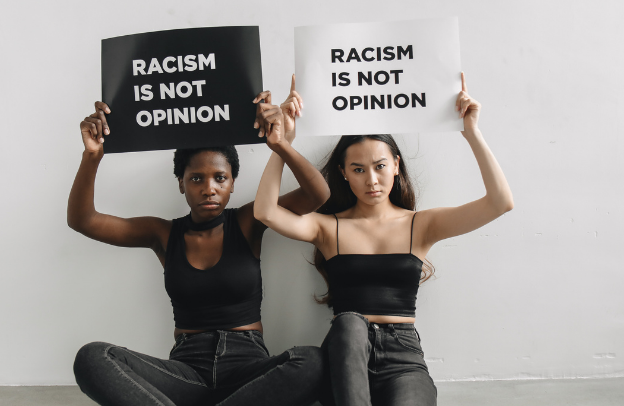Reclaiming Identity: Dismantling the Superiority Complex and Empowering the African Diaspora

Reclaiming one’s identity is a powerful act of resistance, especially for the African Diaspora, whose histories have often been overshadowed by narratives of colonialism and oppression. At the heart of this process lies the dismantling of the superiority complex that has long marginalized African cultures, values, and identities.
Want to learn more about storytelling? Start by downloading the first chapter of The Storytelling Mastery.
In a recent episode of the Obehi Podcast, Professor Oluwafemi Esan, a distinguished scholar in transpersonal psychology, delves into this complex and offers a transformative path forward for the African diaspora.
The Legacy of Racial Superiority
To understand where you stand today, it’s essential to look back at the historical roots of racial superiority. Scientific racism, a pseudoscientific belief that categorized humanity into distinct racial groups, gained traction in the late 19th and early 20th centuries.
See also Nina Simone: Unveiling The Power Of Racial Injustice Through Songs And Creativity
It asserted that empirical evidence supported notions of racial hierarchy, relegating people of African descent to an inferior status. This ideology became ingrained in Western societies, leading to policies that justified colonialism, segregation, and widespread discrimination.
Now you might be wondering. But who were these euro-western pseudoscientists? Well, here are three of them for your consideration:
Arthur de Gobineau (1816–1882)
A French aristocrat and writer, de Gobineau is often considered one of the earliest proponents of scientific racism. His book Essai sur l’inégalité des races humaines (Essay on the Inequality of Human Races) argued that human civilization had declined due to the mixing of races and that the “Aryan” race was superior to others.
His theories became foundational for later racist ideologies, including those used by the Nazis.
Charles Murray (1941–present)
An American political scientist and author, Murray is best known for his controversial book The Bell Curve (1994), co-authored with Richard Herrnstein. The book argued that intelligence, as measured by IQ, varies significantly across racial groups and that these differences are largely genetic.
While his work has been widely criticized for its methodological flaws and its promotion of racial stereotypes, it remains influential in some circles advocating for racial hierarchies.
Samuel George Morton (1799–1851)
A 19th-century American physician, Morton is known for his work in craniometry, the measurement of skulls. He claimed that the size of a person’s skull could determine their intellectual capacity, using his measurements to argue that Caucasians had the largest skulls and were therefore the most intelligent, while other racial groups had smaller skulls and were less intelligent.
His work provided “scientific” justification for racist ideologies and was widely influential in the development of scientific racism during the period.
These individuals, through their pseudo-scientific theories, played a key role in promoting the idea that racial differences were innate and scientifically measurable, helping to justify discrimination and colonialism during their time.
See also Racism And Slavery: How The Hamitic Theory Began To Crumble
By the mid-20th century, however, the scientific community began to disavow these claims. The American Anthropological Association declared in 1998 that “race is a social construct, not a biological fact.” Despite this, the remnants of this ideology persist, manifesting as white supremacy, a global health crisis that affects communities worldwide, especially people of African descent.
According to the World Health Organization, structural racism contributes to health disparities affecting people of African descent, with higher rates of chronic illnesses compared to their white counterparts.
Psychological Underpinnings of the Superiority Complex
As you reflect on the effects of this historical context, consider how it has influenced your perceptions of self and others. The superiority complex often emerges as a defense mechanism against feelings of inadequacy or inferiority.
It’s important to point out as stated by Professor Oluwafemi Esan that many who exhibit this complex may not even recognize it within themselves. He added that the behaviors associated with a superiority complex—boastfulness, vanity, and an unwillingness to listen—can create a toxic environment, both in personal interactions and within larger communities.
See also How to Deal With Toxic Relationship In Business Environment – Amanda Craven
This does not imply that the superiority complex is exclusive to Europeans. As Professor Esan pointed out during the podcast interview, some Africans can also exhibit similar behaviors, displaying the same tendencies toward people who might come from different cultural backgrounds.
Research indicates that a person’s upbringing plays a pivotal role in shaping this complex. Children who receive excessive praise without constructive feedback may develop an inflated sense of self, leading to overconfidence and a dismissal of others’ contributions.
For the African diaspora, this can manifest as competition rather than collaboration, often undermining the unity that is vital for collective advancement. Now, consider the following.
Parents’ well-intentioned efforts to boost their children’s self-esteem, such as showering them with praise, can, according to the publication “Raising Children with High Self-Esteem (But Not Narcissism)” by Eddie Brummelman and Constantine Sedikides, published by the Society for Research in Child Development (SRCD), unintentionally foster narcissism instead.
The Dangers of Embracing Superiority
The implications of a superiority complex extend beyond individual relationships; they can fracture communities. As an individual, you may encounter colleagues or peers who exhibit these traits, making it difficult to foster genuine connections.
On a broader scale, the embrace of racial superiority contributes to xenophobia and cultural racism. The African diaspora has long faced stereotypes and biases, which have perpetuated divisions within communities.
A good example of this is seen in the workplace. According to a report by the Center for Talent Innovation, Black professionals are often required to prove their worth more than their white counterparts, facing scrutiny and bias in their advancement. This reality reinforces a harmful narrative that can lead to feelings of isolation and inferiority among members of the diaspora.
See also Black-ish Star Jenifer Lewis Reveals Devastating Accident During Trip
Moreover, the cycle of oppression can lead to internalized racism. When you internalize the negative perceptions of your identity, it becomes a barrier to personal and communal growth.
This cycle perpetuates feelings of disconnection from your roots, diminishing the rich heritage that defines you.
A Path Forward: Embracing Transpersonal Psychology
What if you could transcend these limitations? Enter transpersonal psychology—a framework that emphasizes the connection between mind, body, and spirit.
Developed by psychologist Abraham Maslow in the 1960s, this approach encourages you to explore dimensions beyond the ego, fostering a sense of connectedness with a greater whole.
This psychological model is particularly relevant for the African diaspora, as it advocates for holistic well-being by acknowledging the interplay between individual beliefs, values, and life experiences.
According to Positive Psychology, Transpersonal Psychology explores experiences that transcend our individual sense of self, extending our awareness beyond personal identity. These experiences often lead to profound shifts in perception, accompanied by emotions such as awe, wonder, joy, and peace.
While Positive Psychology focuses on well-being, flourishing, and optimal human experiences (Seligman & Csikszentmihalyi, 2000), Transpersonal Psychology aims to deepen our understanding of non-ordinary states of consciousness and their potential for psychological transformation, healing, and integration.
In practice, this means embracing your spiritual and cultural identity, allowing it to inform your understanding of self and community.
Practical Applications for Empowerment
To effectively navigate your identity within the global landscape, consider the following practices rooted in transpersonal psychology:
- Cultivate Self-Awareness: Engage in reflective practices such as journaling or meditation. This can help you understand the origins of your beliefs about self-worth and identity.
- Foster Community Connections: Surround yourself with like-minded individuals who uplift and support you. Engage in community activities that celebrate African heritage, such as cultural festivals, art exhibitions, or history workshops.
- Embrace Storytelling: Sharing your story—and listening to the stories of others—can be a powerful tool for healing. Stories create bridges between experiences, fostering empathy and understanding within the community.
- Educational Initiatives: Advocate for and participate in educational programs that teach the history and contributions of African cultures. Knowledge is a potent tool for dismantling stereotypes and fostering pride.
- Focus on Healing: Prioritize mental health by seeking therapy or counseling that integrates cultural perspectives. Healing from past traumas related to racism and discrimination can empower you to move forward.
Reclaiming Your Narrative
As you embrace these practices, you contribute to a broader movement of African unity. Professor Esan emphasizes the importance of solidarity among African nations and the diaspora, suggesting that a united front can dismantle the remnants of colonialism and racial oppression.
See also The Transpersonal Education Philosophy by Professor Oluwafemi Esan
The African Union has recognized this need, setting forth the agenda 2063, which envisions an integrated, prosperous, and peaceful Africa (African Union, 2015).
By working together, you can create new narratives that celebrate your rich heritage. Art, literature, and media play critical roles in this transformation. That is also why we continue to reinforce the conversation in AClasses Academy.
The works of authors like Chimamanda Ngozi Adichie and Wole Soyinka have reshaped perceptions of African identities, challenged stereotypes, and highlighted the complexities of the diaspora experience.
Conclusion: on Dismantling the Superiority Complex and Empowering the African Diaspora
As you navigate your journey, remember that the fight against the superiority complex and its damaging effects is both personal and collective. It requires introspection, community engagement, and a commitment to reclaiming your identity. Embrace the power of your story, connect with your heritage, and seek unity within your community.
In the words of Professor Esan, “To truly embrace African unity, we must first dismantle the chains of superiority that bind us.”
The future of the African diaspora lies in recognizing the beauty of diversity within unity. So, stand tall, reclaim your narrative, and chart a path toward empowerment that honors both your past and your potential.
Want to learn more about storytelling? Start by downloading the first chapter of The Storytelling Mastery.





